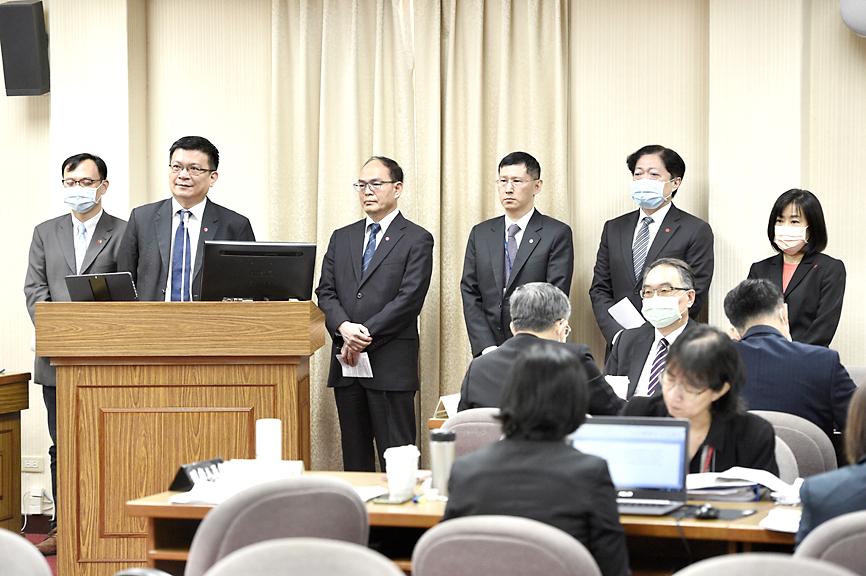The government is on the right track regarding Taiwan-US relations, and has no plans to alter policies because the US is facing a transfer of political power, Deputy Minister of Foreign Affairs Harry Tseng (曾厚仁) said yesterday at the Legislative Yuan in Taipei.
Tseng was among the officials asked to report on the post-US election prospects for Taiwan-US economic and trade relations at a meeting of the Foreign Affairs and National Defense Committee.
Taiwan and the US have a long-term and close economic and trade relationship, Tseng said, adding that last year the US was the nation’s second-largest trade partner, its second-largest export market and its third-largest source of imports.

Photo: George Tsorng, Taipei Times
Total bilateral trade volume last year was more than US$81.08 billion, an increase of 11.7 percent from 2018, he said.
Several top US companies this year have announced plans to increase investment in Taiwan, and the US administration and Congress have also taken actions to enhance the Taiwan-US economic and trade relationship, he said.
US Secretary of State Mike Pompeo on Tuesday last week said that US Undersecretary of State for Economic Growth, Energy and the Environment Keith Krach would lead the Economic Prosperity Partnership Dialogue with Taiwan on Friday, which is to be held in Washington and online, with discussions touching upon issues such as global medical safety, supply chains, 5G security and energy resources, Tseng said.
Asked if the government’s decision to allow imports of US pork containing trace levels of ractopamine as of Jan. 1 would be changed following the US presidential election, Tseng said: “We are a government that is ‘on the right track,’ so the announced policy will not change based on the changes in the US administration.”
When Chinese Nationalist Party (KMT) Legislator William Tseng (曾銘宗) asked if the Ministry of Foreign Affairs (MOFA) would welcome US President Donald Trump if he decided to visit Taiwan before stepping down, Harry Tseng replied “yes.”
When the KMT lawmaker asked if it would be possible for US Navy ships to dock in Taiwan, and if the foreign ministry would accept a Trump announcement to establish formal diplomatic relations with Taiwan, Harry Tseng replied that US Navy ships are “welcome to dock anytime,” and that “there is no reason to refuse” an offer of diplomatic ties.
Later in the day, the ministry issued a statement to clarify Tseng’s responses, saying that inviting high-ranking US officials for visits and security cooperation operations have always been important diplomatic tasks, but hypothetical questions such as invitations to Trump or Pompeo to visit or allowing US Navy ships to dock in Taiwan have not been planned by the ministry, nor discussed with the US.
The ministry stays in close and smooth communication with the US, it said, adding that it would continue to follow the principles of mutual trust and reciprocity to deepen the Taiwan-US partnership, the statement added.

CHAOS: Iranians took to the streets playing celebratory music after reports of Khamenei’s death on Saturday, while mourners also gathered in Tehran yesterday Iranian Supreme Leader Ayatollah Ali Khamenei was killed in a major attack on Iran launched by Israel and the US, throwing the future of the Islamic republic into doubt and raising the risk of regional instability. Iranian state television and the state-run IRNA news agency announced the 86-year-old’s death early yesterday. US President Donald Trump said it gave Iranians their “greatest chance” to “take back” their country. The announcements came after a joint US and Israeli aerial bombardment that targeted Iranian military and governmental sites. Trump said the “heavy and pinpoint bombing” would continue through the week or as long

TRUST: The KMT said it respected the US’ timing and considerations, and hoped it would continue to honor its commitments to helping Taiwan bolster its defenses and deterrence US President Donald Trump is delaying a multibillion-dollar arms sale to Taiwan to ensure his visit to Beijing is successful, a New York Times report said. The weapons sales package has stalled in the US Department of State, the report said, citing US officials it did not identify. The White House has told agencies not to push forward ahead of Trump’s meeting with Chinese President Xi Jinping (習近平), it said. The two last month held a phone call to discuss trade and geopolitical flashpoints ahead of the summit. Xi raised the Taiwan issue and urged the US to handle arms sales to

BIG SPENDERS: Foreign investors bought the most Taiwan equities since 2005, signaling confidence that an AI boom would continue to benefit chipmakers Taiwan Semiconductor Manufacturing Co’s (TSMC, 台積電) market capitalization swelled to US$2 trillion for the first time following a 4.25 percent rally in its American depositary receipts (ADR) overnight, putting the world’s biggest contract chipmaker sixth on the list of the world’s biggest companies by market capitalization, just behind Amazon.com Inc. The site CompaniesMarketcap.com ranked TSMC ahead of Saudi Aramco and Meta Platforms Inc. The Taiwanese company’s ADRs on Tuesday surged to US$385.75 on the New York Stock Exchange, as strong demand for artificial intelligence (AI) applications led to chip supply constraints and boost revenue growth to record-breaking levels. Each TSMC ADR represents

Pro-democracy media tycoon Jimmy Lai’s (黎智英) fraud conviction and prison sentence were yesterday overturned by a Hong Kong court, in a surprise legal decision that comes soon after Lai was jailed for 20 years on a separate national security charge. Judges Jeremy Poon (潘兆初), Anthea Pang (彭寶琴) and Derek Pang (彭偉昌) said in the judgement that they allowed the appeal from Lai, and another defendant in the case, to proceed, as a lower court judge had “erred.” “The Court of Appeal gave them leave to appeal against their conviction, allowed their appeals, quashed the convictions and set aside the sentences,” the judges